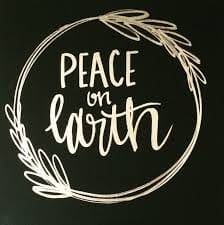 One of my favorite Christmas performances when I was a little guy was a really odd, but strangely rendition of “The Little Drummer Boy” featuring the paradoxical duet of Bing Crosby and David Bowie (you can find it on YouTube-I checked). I still listen to it every year. Even with the 70s vibe, it’s still a wistful, melodic dream of peace on earth, can it be…? that resonates with us when we hear it. We all want peace.
One of my favorite Christmas performances when I was a little guy was a really odd, but strangely rendition of “The Little Drummer Boy” featuring the paradoxical duet of Bing Crosby and David Bowie (you can find it on YouTube-I checked). I still listen to it every year. Even with the 70s vibe, it’s still a wistful, melodic dream of peace on earth, can it be…? that resonates with us when we hear it. We all want peace.
As compelling as it is, however, it’s not reality– at least, not as it pertains to life in a Genesis 3 world. If there is one thing this world is not, it’s peaceful. Bombings in Turkey, killings in Syria, wars and revolutions, whatever ISIS or al Qaeda has up their sleeves next. In our own nation, the shootings this past summer, post-election bickering, riots, and sexual violence all bear witness to tumultuous times. And, none of this is new. At no time in the 2,000 years since Jesus was born has mankind ever been at peace, ever been free from violence, tyranny, and oppression. Even the so-called Pax Romana, the “Roman Peace” at the time of Christ, was harmony under the heel of Rome’s boot, held together by the very oppression and cruelty that put Jesus on the cross. Judea of Christ’s day was a place of occupied territory, insurgency, the equivalent of modern-day Afghanistan or Iraq.
And yet, on the night God became man, the angels appeared and praised God, singing, “Glory to God in the highest, and on earth peace, good will toward men!” What was this all about? Was this legit? Was peace on earth something that was actually happening, or was it merely some heavenly Hallmark platitude, a divine Bowie and Bing singing to “give peace a chance?” A wish of a brighter future that would never define current reality?
It should be self-evident by now that the Prince of Peace brought, not freedom from earthly strife, but something significantly more enduring. First, Christ made peace between you and God. When Adam and Eve were banished from the garden, God set a flaming sword to guard the entry, metaphorically and physically blocking the gate back to Him. From that point forward, you and I were at enmity with God. His wrath was visited upon us, and rightfully so. Christ ultimately came to bear that wrath, to take on the weight of our God’s offense against us, so that you and I could be at peace with Him–restored and renewed, as children of God and His adopted sons and daughters. The Incarnation was the opening salvo in the campaign to purchase you back from death, to restore peace between you and God.
This peace also put an end to our relentless need to find dignity, value, and worth in ourselves. The peace ends the futile chase after being successful enough, or attractive enough, or having a good enough husband or wife or children to convince ourselves that we matter, that we are significant, that we’re worthy. That chase is a bottomless soul-sucking maw of deceit, destined to swallow anything in its path. The Incarnation is the down payment on the ultimate satisfaction of your need, the sating of your desire to mean something, with the reality that you were worth the hideous, gut-wrenching death of He who spoke the universe into existence. That’s how much you matter. To rest in that truth, to stop the endless, fruitless grasping for the “next big thing”, brings untold peace.
Finally, the Prince of Peace brings a stillness and joy that transcends your circumstances, whether war, insurgency, disaster, illness, or death. He is the power of the living God in you, your eternal destiny secured. This means that it is all actually going to be okay, in fact, better than you could ever dream, and the worst that it is right now is as bad for you as it will ever be- because there is a day coming of actual, eternal, earthly peace under Christ. While promising a greater future, the Prince of Peace speaks tranquility into our hearts, telling us He has come, and all is well. No matter how busy and chaotic our lives, our souls and spirits can be quiet and still. Earthly peace, circumstantial peace, is good, but not transcendent. While you have it, you’re wondering how long it will last, and you’re fighting to keep it. The peace that the Prince brings is always there, always yours.
Peace is never free; there is always a cost: the greater the peace, the greater the cost. This transcendent peace, peace with God, peace with yourself and your own quest for identity, eternal peace, cost Christ the cross. In return, He got that which He did not have, and which was most precious to Him: us. And, one of the shocking, humbling mysteries of Christmas was that He considered that a good bargain.
Leave a Reply